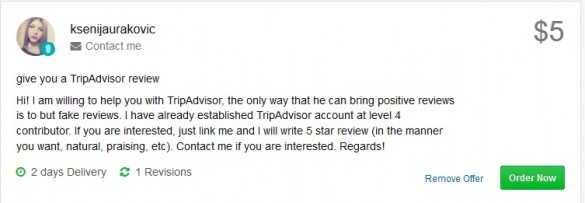A holiday should be all about unwinding by replacing any stress with serenity and relaxation. Unfortunately, scammers in the hospitality sector are out to dupe you before you’ve even left home.
Recommendations from friends, relatives and colleagues are the best way to go when choosing a place to stay. But what if you don’t know anyone who has been to your intended destination? You look online, perusing sites such as TripAdvisor, which bills itself as the “world’s largest travel site” with “200 million+ unbiased traveler reviews”.
Most of TripAdvisor’s reviews are genuine, but plenty are biased or even fake. If a hotel manager or owner wants a positive online review, they simply write their own or have their friends make some. These look suspicious when a reviewer has made only a solitary review.
So, if you want a seasoned reviewer to provide a glowing endorsement of your hotel, you just head over to a site called Fiverr, where people provide all sorts of services for only US$5. You join with an email address and start hiring people to write reviews. Or, more accurately, hire them to post content that you have written. If your hotel has a Facebook page, you can purchase thousands of Likes, as well as single reviews.
Curious to see how Fiverr worked, I requested advice on how to gain positive TripAdvisor reviews for a friend’s hotel. Within a few hours, I had 21 responses from people offering to post fake reviews and ‘Likes’.
“I am ready to write and post 10 TripAdvisor positive reviews for your hotel in Indonesia. I have multiple TripAdvisor accounts with good standing and with different IPs,” said one seller.
Another seller told me she was willing to write 5-star fake reviews from her TripAdvisor “Level 4 Contributor account”.
If you’re too cheap to pay US$5 and would prefer a review in Indonesian, then just go to the online behemoth that is Kaskus, where you can find reviewers offering their services for as little as Rp.5,000.
The upshot is, beware of overly effusive reviews. On the other side, some companies hire people to write and post negative reviews about their competitors. This happens in many industries, from aviation to restaurants.
I once received a job offer that went like: “We need an avid Twitterer, Facebooker, skilled in writing, available to work from home for about two hours a day, five days a week, starting at Rp.5 million a month.” The job was to create negative social media content about a particular company.
A friend who owns a restaurant in Jakarta was visited by a man who offered to provide a positive review and photos in a food magazine in return for a payment of Rp.5 million. He insinuated that failure to provide any payment would result in a negative listing.
Going Nowhere
If you are planning a holiday, be sure to book directly with a reputable hotel. Beware of online travel agents offering packages that seem too good to be true. Even reasonably priced package tours may be a scam.
A woman named Sarah Jihan managed to defraud about 120 people who had booked holidays to Japan. She started a thread on Kaskus in March 2015, offering a group package holiday to Japan over April 5–11, 2016, (seven days and six nights) for Rp.12.5 million, which could be paid in monthly instalments up to February 2016.
A week before departure, her customers had still not received their tickets. Using a WhatsApp group, they asked Sarah for an explanation. She reassured them that an associate, Gina, was handling the tickets. Then, on April 1, Sarah posted a message on Kaskus claiming she had to cancel the trip because a person entrusted to buy tickets had run away with the money. “Sorry I have not been able to contact you directly because I am still in a state of great shock,” she wrote. She claimed she had reported the matter to police and would later issue individual refunds. The customers were willing to believe her until she abruptly deleted their WhatsApp group and also ceased all communication via Path, Facebook, Instagram and telephone. Only her Kaskus posts remain.
Dozens of her victims on April 6 reported Sarah to police. It transpired she had pulled the same scam last year and was arrested for four days until she was able to issue refunds – with money newly taken from people who had booked holidays for 2016. She had allegedly told the first set of victims not to make critical online posts if they wanted to receive refunds.
One of the latest victims said Sarah had arranged a gathering at a customer’s house to inspire confidence in her online travel business. But when they began asking for proof of tickets and hotels, she could not show them anything.
Sarah now faces charges of online fraud. The case has embroiled her alleged sister, a TV actress named Shirin Safira. Reports said some of the victims’ funds had been deposited in an account held by Shirin.
Scamming about 120 would-be tourists is small fry in comparison to the embezzlement conducted by government officials and companies involved in sending Muslims on the annual haj pilgrimage to Saudi Arabia. Former religious affairs minister Suryadharma Ali was in January sentenced to six years in jail for embezzling billions of rupiah in haj funds from 2010 to 2013.
More recently, the operators of PT Sahabat Sukses Indonesia, a travel agency that charged from Rp.25 million to Rp.35 million for minor pilgrimages to Saudi Arabia, was reported to police because it had allegedly failed to honour commitments to clients.
One of the biggest of all travel scams in Indonesia is when the country’s legislators take free holidays abroad under the absurd claim that they are “comparative studies”. Such legislators would be better off using state funds to remedy problems in their own country, rather than squandering time and money overseas. Unfortunately, some local schools have taken a leaf out of the legislature’s book by sending students on “comparative study” excursions abroad at massively inflated prices.
So, when considering your next holiday, do your research first to ensure you’ll get value for money. And if you’re considering any form of comparative study, spend your own money.





